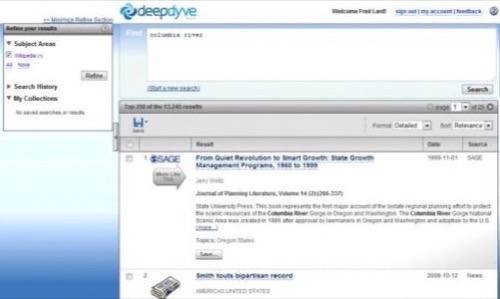DeepDyve is a new search engine that is aimed at students, academics, and knowledge workers. DeepDyve’s mission is to index the ‘deep web‘ that is hidden behind pay walls and subscription fees. We first looked at DeepDyve in September, when it was still called Infovell and hidden behind a pay wall itself. Starting today, Infovell has not only changed its name, but is also available in a free version.

Since the launch of its first version in September, DeepDyve has slightly improved its user interface, but if you have used a subscription database before, DeepDyve’s interface and feature set, with the ability to narrow your results by subject areas and save your searches, will look quite familiar.
Paid Version
DeepDyve also released a paid version of its service for $45 a year month, which will also allow you to refine your searches by content type. Other features of the paid version include dynamic clustering, visual clustering, and advanced search.
Verticals
DeepDyve is slowly expanding into more search verticals, but for now, its focus is on life sciences, physical scienes, and patents, though it also indexes a few humanities journals. The service also indexes newspaper and lets you search for Wikipedia articles as well. Overall, DeepDyve’s index consists of about 500 million pages.

What’s New?
DeepDyve launched with a good amount of hype this morning, but after our initial tests, we have come away somewhat disillusioned. Most users who need to search academic sources can already do so through databases like Academic Search Premier, Lexis-Nexis, PubMed, or Science Direct. These services also typically feature more advanced search functions and often give you direct access to the full text of your sources as well.
Information is Still Behind a Pay Wall
As useful as it can be to be able to search the deep web, most of the articles retrieved by DeepDyve still sit behind paywalls anyway, and you either need to have access to an institutional subscription to access these sources or pay a hefty fee per article.
DeepDyve markets itself as being the first search engine that allows its users to “access a wealth of untapped information that resides on the ‘Deep Web'” – and if you forget about Google Scholar and the myriad of subscription databases, then that is surely true. In its current incarnation, however, DeepDyve is mostly an interesting technical experiment.

















